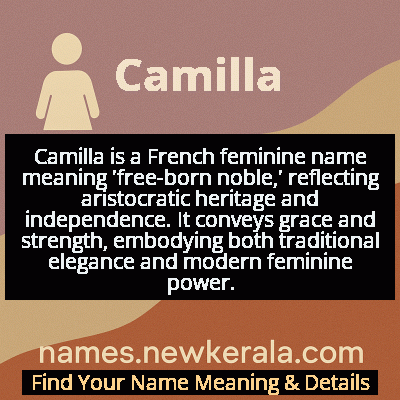Camilla Name Meaning & Details
Origin, Popularity, Numerology Analysis & Name Meaning of Camilla
Discover the origin, meaning, and cultural significance of the name CAMILLA. Delve into its historical roots and explore the lasting impact it has had on communities and traditions.
Name
Camilla
Gender
Female
Origin
French
Lucky Number
6
Meaning of the Name - Camilla
Camilla is a French feminine name meaning 'free-born noble,' reflecting aristocratic heritage and independence. It conveys grace and strength, embodying both traditional elegance and modern feminine power.
Camilla - Complete Numerology Analysis
Your Numerology Number
Based on Pythagorean Numerology System
Ruling Planet
Venus
Positive Nature
Harmonious, responsible, caring, and artistic.
Negative Traits
Overly idealistic, superficial, possessive, or jealous.
Lucky Colours
Pink, turquoise.
Lucky Days
Friday.
Lucky Stones
Diamond, turquoise.
Harmony Numbers
2, 3, 9.
Best Suited Professions
Artists, musicians, teachers, healthcare workers.
What People Like About You
Warmth, nurturing nature, artistic flair.
Famous People Named Camilla
Camilla Parker Bowles
Royal consort
Queen Consort of the United Kingdom
Camilla Collett
Writer
Norway's first feminist writer
Camilla Läckberg
Author
Internationally bestselling crime fiction writer
Camilla Belle
Actress
Starred in major Hollywood films
Name Variations & International Equivalents
Click on blue names to explore their detailed meanings. Gray names with will be available soon.
Cultural & Historical Significance
During the Renaissance and Enlightenment periods, the name experienced a revival as classical names regained popularity among European aristocracy. In French culture particularly, the variant 'Camille' became fashionable among the nobility, often associated with grace, intelligence, and artistic sensibility. The name crossed into English-speaking countries in the 18th century, where it maintained its aristocratic connotations while adapting to local naming traditions. Throughout the 19th and 20th centuries, Camilla became a symbol of refined femininity combined with inner strength, bridging classical heritage with modern sensibilities.
The name's contemporary significance has been amplified by prominent figures like Queen Camilla, reinforcing its association with dignity, service, and modern royalty. This evolution demonstrates how Camilla has maintained its cultural relevance across centuries, adapting to changing social norms while preserving its core values of nobility and strength.
Extended Personality Analysis
Individuals named Camilla are often perceived as possessing a unique blend of grace and resilience. They typically exhibit refined manners and sophisticated tastes, coupled with a strong sense of independence and determination. Many Camillas display natural leadership qualities, often taking charge in social or professional situations with poise and confidence. Their aristocratic name heritage frequently translates into a dignified presence that commands respect while maintaining approachability.
Psychologically, Camillas are often characterized by their balanced nature—they combine emotional intelligence with practical problem-solving skills. They tend to be excellent communicators who value meaningful relationships and cultural enrichment. While they may appear reserved initially, they reveal warmth and loyalty to those they trust. Their name's warrior origins often manifest as inner strength during challenges, allowing them to navigate difficulties with remarkable composure.
This combination of elegance and fortitude makes Camillas particularly effective in roles requiring both interpersonal finesse and decisive action. They often excel in careers that demand both creative thinking and organizational skills, such as education, arts management, or entrepreneurship. The name seems to inspire a sense of responsibility and purpose, with many Camillas developing strong ethical frameworks and commitment to community service throughout their lives.
Modern Usage & Popularity
In contemporary naming practices, Camilla has experienced a notable renaissance, particularly in the past two decades. The name consistently ranks within the top 200 girls' names in English-speaking countries, with its popularity peaking following significant royal events. Modern parents are drawn to Camilla for its elegant three-syllable rhythm, international recognizability, and the perfect balance it strikes between classic sophistication and contemporary strength. The name appeals to families seeking something traditional yet distinctive, aristocratic but not overly formal. Its usage spans diverse socioeconomic backgrounds, though it maintains particular popularity among educated, cosmopolitan families who appreciate its cultural depth and cross-linguistic versatility. Current trends show Camilla becoming increasingly popular in urban centers and among parents who value names with strong historical roots and positive feminine associations.
Symbolic & Spiritual Meanings
Symbolically, Camilla represents the harmonious union of contrasting qualities—nobility and accessibility, strength and grace, tradition and modernity. The name carries deep connotations of freedom and independence, directly connected to its original meaning of 'free-born' and reinforced by its mythological warrior heritage. It has come to symbolize the modern woman who elegantly balances traditional values with contemporary empowerment and agency. In botanical symbolism, Camilla resonates with the camellia flower, which across various cultures represents perfection, refined beauty, and admiration between lovers or friends. The name also embodies the concept of 'noble service'—the idea that true aristocracy manifests not merely through lineage but through how one serves others and contributes meaningfully to society. This rich symbolic tapestry makes Camilla a name that speaks simultaneously to heritage, personal strength, and forward-looking purpose in the modern world.

